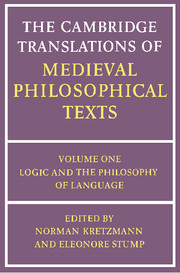Book contents
- Frontmatter
- Contents
- Preface
- General Introduction
- 1 BOETHIUS: On Division
- 2 Anonymous: Abbreviatio Montana
- 3 PETER OF SPAIN Predicables Categories
- 4 LAMBERT OF AUXERRE: Properties of Terms
- 5 Anonymous: Syncategoremata Monacensia
- 6 NICHOLAS OF PARIS: Syncategoremata (selections)
- 7 PETER OF SPAIN: Syllogisms; Topics; Fallacies (selections)
- 8 ROBERT KILWARDBY: The Nature of Logic; Dialectic and Demonstration
- 9 WALTER BURLEY: Consequences
- 10 WILLIAM OCKHAM: Modal Consequences
- 11 ALBERT OF SAXONY: Insolubles
- 12 WALTER BURLEY: Obligations (selections)
- 13 WILLIAM HEYTESBURY: The Compounded and Divided Senses
- 14 WILLIAM HEYTESBURY: The Verbs ‘Know’ and ‘Doubt’
- 15 BOETHIUS OF DACIA: The Sophisma ‘Every Man is of Necessity an Animal’
- Index
3 - PETER OF SPAIN Predicables Categories
Published online by Cambridge University Press: 05 June 2012
- Frontmatter
- Contents
- Preface
- General Introduction
- 1 BOETHIUS: On Division
- 2 Anonymous: Abbreviatio Montana
- 3 PETER OF SPAIN Predicables Categories
- 4 LAMBERT OF AUXERRE: Properties of Terms
- 5 Anonymous: Syncategoremata Monacensia
- 6 NICHOLAS OF PARIS: Syncategoremata (selections)
- 7 PETER OF SPAIN: Syllogisms; Topics; Fallacies (selections)
- 8 ROBERT KILWARDBY: The Nature of Logic; Dialectic and Demonstration
- 9 WALTER BURLEY: Consequences
- 10 WILLIAM OCKHAM: Modal Consequences
- 11 ALBERT OF SAXONY: Insolubles
- 12 WALTER BURLEY: Obligations (selections)
- 13 WILLIAM HEYTESBURY: The Compounded and Divided Senses
- 14 WILLIAM HEYTESBURY: The Verbs ‘Know’ and ‘Doubt’
- 15 BOETHIUS OF DACIA: The Sophisma ‘Every Man is of Necessity an Animal’
- Index
Summary
Introduction
Peter of Spain seems to have been born into a noble family in Lisbon, Portugal, around 1205. He studied in Paris in the 1220s and taught medicine in Siena from 1246–1250. In 1263 he was appointed magister scholarum of the cathedral school of Lisbon, and in 1272 Pope Gregory X appointed him as court physician at Viterbo. He became Archbishop of Brage as well as Cardinal- Bishop of Frascati (Tusculum) in 1273. In 1276 he became Pope John XXI, though he was said to be more interested in his studies than in his duties as pope.
His most important acts as pope were his bulls of January 18 and April 28, 1277, to Stephen Tempier, Bishop of Paris. In the first, he ordered the bishop to investigate errors being taught at the University of Paris, and in the second he mandated a purification of the doctrines of the Parisian masters. He died in a way appropriate to his life and interests: In order to continue his studies even while pope, he ordered the addition of an apartment to the papal palace at Viterbo. On May 14, 1277, the roof of this apartment collapsed on him, and he died of the injuries on May 20.
Peter wrote a number of works on medicine, including the famous Thesaurus pauperum, composed while he was Gregory's court physician. He also wrote various psychological treatises, including a commentary on Aristotle's De anima, and commentaries on Dionysius the pseudo-Areopagite.
- Type
- Chapter
- Information
- The Cambridge Translations of Medieval Philosophical Texts , pp. 79 - 101Publisher: Cambridge University PressPrint publication year: 1989



